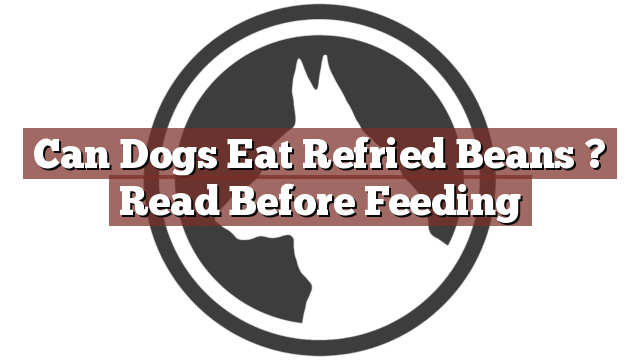Understanding Your Dog’s Dietary Needs
As a responsible dog owner, it is crucial to understand your furry friend’s dietary needs. Feeding your dog a well-balanced diet is essential for their overall health and well-being. While dogs primarily thrive on a diet rich in animal-based protein, they can also benefit from certain fruits, vegetables, and grains in moderation. However, it is important to be cautious and informed about what foods are safe for dogs to consume. In this article, we will tackle the question, "Can dogs eat refried beans?" to help you make an educated decision about including this food item in your dog’s diet.
Can Dogs Eat Refried Beans? Read Before Feeding
No, dogs should not eat refried beans. Although beans are a great source of protein, refried beans are typically prepared with added ingredients that are harmful to dogs. Refried beans often contain high levels of sodium, spices, seasonings, and sometimes even onions and garlic. These ingredients can be toxic to dogs and may cause digestive issues such as upset stomach, indigestion, or even more severe complications like onion or garlic poisoning. It is crucial to keep in mind that our canine companions have different digestive systems compared to humans, making certain foods unsuitable for their consumption.
Pros and Cons of Feeding Refried Beans to Dogs
While refried beans are not recommended for dogs, let’s briefly examine the pros and cons of including this food item in your dog’s diet.
Pros: Refried beans can provide a good source of protein and fiber for dogs. The protein content in beans can aid in muscle development and maintenance. Additionally, the fiber present in beans can promote healthy digestion and regulate bowel movements.
Cons: The cons of feeding refried beans to dogs outweigh the potential benefits. The added ingredients, such as sodium, spices, and seasonings, can have adverse effects on a dog’s health. These ingredients can lead to gastrointestinal issues, sodium imbalances, and, in worst cases, toxicity from onions or garlic.
In Conclusion: Consider Your Dog’s Health and Consult a Vet
In conclusion, it is best to avoid feeding refried beans to your beloved canine companion. While beans themselves can be a healthy addition to a dog’s diet, the added ingredients in refried beans make them unsuitable and potentially harmful to dogs. It is always important to prioritize your dog’s health and well-being by providing them with a balanced and appropriate diet. If you have any doubts or concerns about your dog’s diet, it is recommended to consult with a veterinarian who can provide you with professional guidance tailored to your dog’s specific dietary needs. Remember, your dog’s health should always come first.
Thank you for taking the time to read through our exploration of [page_title]. As every dog lover knows, our furry friends have unique dietary needs and responses, often varying from one canine to another. This is why it's paramount to approach any changes in their diet with caution and knowledge.
Before introducing any new treats or making alterations to your dog's diet based on our insights, it's crucial to consult with a veterinarian about [page_title]. Their expertise ensures that the choices you make are well-suited to your particular pet's health and well-being.
Even seemingly harmless foods can sometimes lead to allergic reactions or digestive issues, which is why monitoring your dog after introducing any new food item is essential.
The content provided here on [page_title] is crafted with care, thorough research, and a genuine love for dogs. Nevertheless, it serves as a general guideline and should not be considered a substitute for professional veterinary advice.
Always prioritize the expert insights of your veterinarian, and remember that the health and happiness of your furry companion come first.
May your journey with your pet continue to be filled with joy, love, and safe culinary adventures. Happy reading, and even happier snacking for your canine friend!

